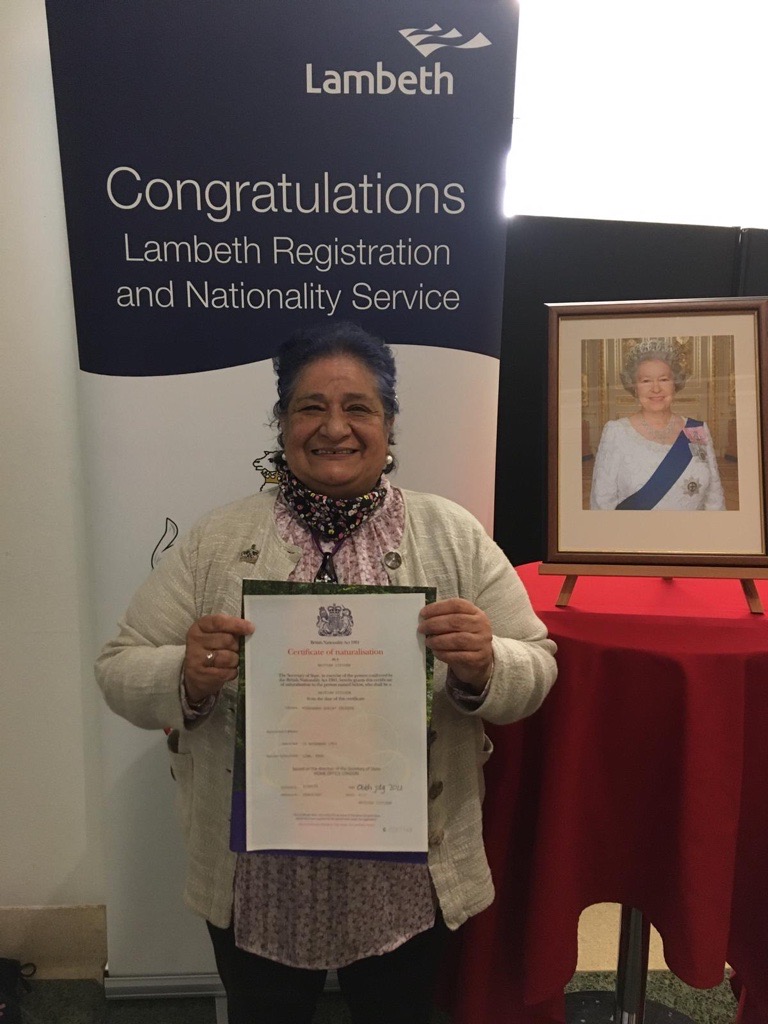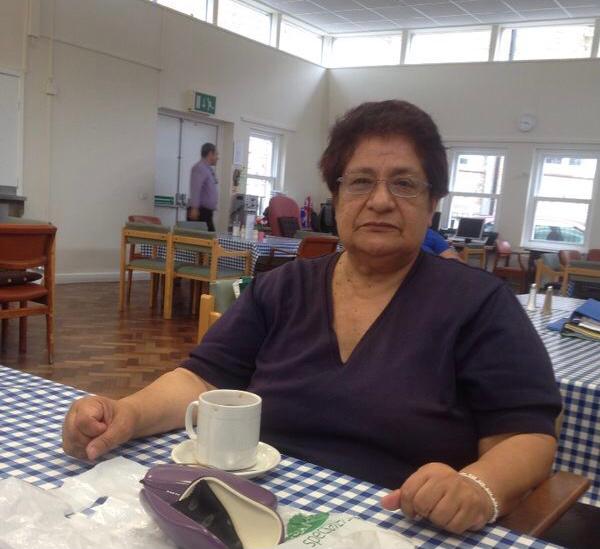Interviewer: Hi Celeste!
Cardenas: Hi Annie! So nice to meet you, this is the first time we’re meeting in person!
Interviewer: Yes! Thank you for doing this interview. Today we’re going to be talking about your experiences and what solidarity means to you. So, before you moved to London, you lived in Italy. How is the experience of being a Peruvian migrant in Italy different to being a Peruvian in London? Is there more of a community here?
Cardenas: I lived in Italy for sixteen years with my three children. I moved to London in 2014, so I’ve lived here for eight years. In London the Latin American community is a lot larger. London is different to other places – we have more multiculturalism here. In Italy, I had to learn to be Italian. We only came together (as a Latin American community) to celebrate our national holidays, such as Independence Days, but that’s it.
Interviewer: When did you first hear of the Latin American Disabled people’s project?
Cardenas: As soon as I arrived! My daughter was living here for a year and a half before I moved. She made a list of Latin American organisations for me – the addresses, the email addresses. She said you’re going to be very busy! I went to the Latin American Disabled People’s Project first and began learning English the next day.
Interviewer: That’s so good! So, we know migrants and refugees in England are given intensive paperwork in order to access the resources they are entitled to. Does LADPP help with this?
Cardenas: Yes, they offer consultancy and can speak to people in English on our behalf. We’re not confident with our English, so the services at LADPP, LAWA, IRMO can help us with legal documents and any funds we are entitled to.
Interviewer: What projects are you involved in or have you been involved in at LADPP?
Cardenas: One of the most important things I did at LADPP was volunteering in the befriending service. It’s important to me, while we’re improving our skills, confidence, knowledge about the city, how to resolve our problems, where to go, who to talk to, I think that we have to share these resources. When I meet new people, I say, be quiet! don’t worry! This is this organisation, this is for families; this is this organisation, this is for women.
Also, lots of similar organisations came together for meetings during Brexit. I wish we could do more of that. We need to be united. It’s also another opportunity to meet other people in my community.
Interviewer: Are you involved in any other organisations for migrants and refugees?
Cardenas: Yes, Latin American Women’s Aid (LAWA), Latin American Women’s Rights Service (LAWRS), Indoamerican Refugee Migrant Organisation (IRMO), I went to Latin American House (LAH) a few times, but it’s in North London, and of course, Ripe Learning.
Interviewer: What kinds of things do you do at LAWA?
Cardenas: In LAWA, we have an English conversation group. My teacher is from English for Action, she’s English, her mother is from Haiti, her father is from Ireland. This week we were talking about Haitian Independence. She was showing us Haitiain dances, songs, and talking about the experiences of Hatiains today. The teacher is so sweet with us, I can’t believe it.
Interviewer: How about LAWRS?
Cardenas: I began wellbeing workshops at LAWRS (and IRMO) five years ago. I’ve learnt I have to love myself, that I have to be the most important person in the world for me. Now, I understand that…If I understood this in Peru! *she laughs*
In Peru, misogyny is ingrained in our culture; men consider themselves superior to women. I don’t like that, I don’t want to remember that. In Peru, the children come first, or sometimes the husband first, then the children, then the women. We are the least important. And we think that that’s normal. It’s not normal.
Interviewer: Are the women in these groups all from Latin American countries or other countries too?
Cardenas: It is mostly all Latin American women but in LAWRS we meet with other women’s groups too. In these groups, our classmates are from places like Uganda, Afghanistan, Algeria, Nigeria. We talk about our history, our traditions. We learn about what is happening to women in these countries. In these groups, we know that we aren’t alone and we can support each other.
And you know, the biggest problems, they are patterns.
Interviewer: So in these English conversation groups, you share your experiences as women, educate and support each other?
Cardenas: Yes. In these workshops and in our English classes in London, online or in-person, not only are we safe, we feel safe too.
Interviewer: This sounds like a really great example of feminist community care. I’m so happy you have this.
Cardenas: In LAWA, we also have a group for elderly people. It’s called Growing Together, or Creciendo Juntos in Spanish. We are just for fun!
Interviewer: That’s so nice! What kind of things do you do together?
Cardenas: On Mondays, we have handcrafts, like knitting. On Thursdays, we go to the park or cook together in one of our homes. Every month, we have a birthday celebration for everyone born in that month. We eat, we dance, we sing.
Lambeth council gave us a plot of land to grow a small community garden together. Twice a week, we get together to tend the garden.
All of us are really good friends and it’s so good for our mental health – we meet up, we close the door, and all our problems stay out. We’re laughing for three hours.
But, if you are more than about 75 years old, you didn’t have the same opportunity to meet these Latin American groups.
Interviewer: How come?
Cardenas: The organisations just didn’t exist then. Maybe people just didn’t have the time. They were working so much. They didn’t have the time to have good friends, to be in good friendships just as they didn’t have the time to study English.
Interviewer: What’s changed in this time?
Cardenas: I think the internet. Now, I can easily find where to go, what address and it’s easy. We know about every opportunity we have to meet, we’re sent invitations for workshops. I think that’s one of the reasons.
Interviewer: Solidarity Knows No Borders week of action is happening from June 13th-19th, what do you think are the best ways to show solidarity with migrants and refugees in the UK?
Cardenas: Education and communication. None of us have enough information. We also need more funding, especially for English classes.
Interviewer: I agree! What about other forms of resistance?
Cardenas: Protesting is more dangerous for migrants and refugees. Of course we would like to, but the consequences of arrest are much higher for us. We are afraid.
But we can do our work with our neighbours. I do what I can, I do what I have in my hands. Everytime I see my neighbours, I say, please, I have to tell you something, two minutes please! This organisation is offering this, this organisation is offering that. We have yoga, we have a creche! I tell them where they can study English for free, like at Ripe Learning and English for Action. I tell them, Let’s go together! We’ll get coffee together.
I felt safe going to the International Women’s Day march because it was a planned protest. We were all together – all singing together on the streets, holding placards, using our voices. And the people walking past were clapping. Finally, no? Finally.
Interviewer: Earlier in this interview, you were speaking about the experiences of women in Peru, throughout Latin America, and your classmates’ experiences as women in places like Uganda, Afghanistan, Algeria, Nigeria. Is it important to you to be celebrating IWD on the streets in a group of women?
Cardenas: So important! It was so nice.
Interviewer: Tell us a bit about your experience as a Ripe Learning student. How long have you been a student for? What has your experience of Ripe Learning been like?
Cardenas: Wonderful! I began studying English with Ripe five or six years ago. I have IT classes with Evelyn Llumitasig and I have English classes with you. I love both classes – very good teachers, very good experiences.
I can’t find the words. Not only are you prepared, but you are empathic with us. You are professional, but more than that, you are so sweet with us. You’re patient. You always try to get everyone to speak, which is so important.
In 2020, the director of Ripe Learning, Anthony Djondo, helped me get my British Citizenship. He had known me as a student for over five years, so he was my referee.
Interviewer: I’m so happy your experience at Ripe Learning has been so positive! Is there anything else you would like to see Ripe Learning do to show more solidarity with our migrant and refugee students and staff?
Cardenas: I’d like us all to get together for workshops. For example, we could have a workshop about the energy crisis. We need more information and we need to learn the meanings of these technical terms.
Interviewer: Yeah, good idea. This could even be incorporated into English classes where we could teach the terminology. What do you think?
Cardenas: Yes. I’d like that.
Interviewer: How about looking at energy bills together in class? We could learn more vocabulary while supporting each other in the crisis?
Cardenas: Yes, something like this! I want to educate myself on the energy crisis and understand these terms in English.
Interviewer: Perfect! Would you also be interested in doing skill-sharing workshops (with higher English level classes) where a student prepares a ten minute presentation about something they have a lot of knowledge in? It would be practically useful and also good English practice, particularly in learning specialised vocabulary.
Cardenas: Yes, I would like that!
Interviewer: Are there other topics you would like workshops on?
Cardenas: I would like workshops on benefits and housing.
Interviewer: Yes, definitely. My last question is, what does solidarity mean to you?
Cardenas: Solidarity is a big word. We need to work together, to take action together.
I think we begin with education – listening to other women, learning about what is happening elsewhere too. When I was in the women’s group learning about Haiti, how people are living there, how women are living there, I thought, why don’t we know this? Why don’t people know this? We need more awareness and education.
We also have to be more empathic with people. People are arriving here from very difficult realities – and all the things they have to pass to be here. It’s not easy. We have to know what is happening. We need information, empathy, and respect.
If you know what is happening, you can choose: do you want to do something or do you just want to live your own life?


